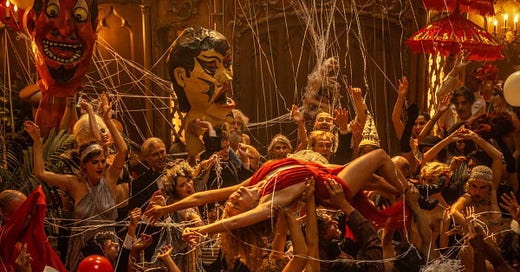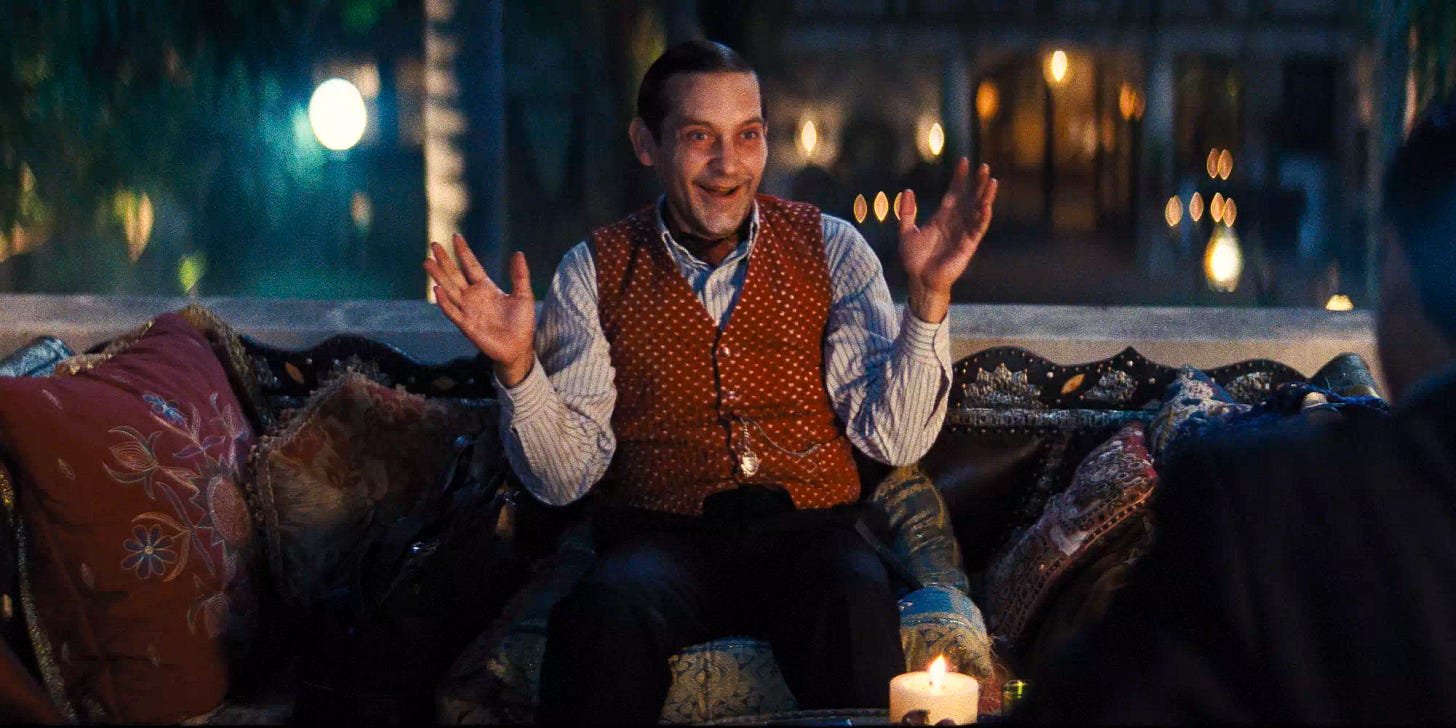Babylon and the Damien Chazelle Project
Is Babylon the end of movies or the end of Damien Chazelle?
2022 was the cinematic year of reflection. Our great auteurs took to the screen to tell nostalgic, honest, complicated stories about their past, Hollywood history, and how the two collided to create the figures we know and love. Sometimes those people and the industry they work in are more a creation of our popular imagination than a tangible reality. The mythos of Hollywood is shiny and star-studded. The reality these artists posit is gilded- gold on the outside to cover the rot lurking beneath.
After seeing Babylon, an unassuming audience member might have walked out thinking the person who made that film was an eighty-year-old man who had a long and successful career in film. Maybe he won a Best Director Academy Award? Maybe even Best Picture. Nevertheless, the imagined director of Babylon likely had a long career in an industry that they now can honestly reflect on.
You probably wouldn’t think that this was only the director’s fourth feature film. Or that he was the youngest Best Director winner in Academy Awards history and one of the most promising new filmmakers on the scene.
That’s because Babylon feels like a period, not a comma. The film unfurls like an artist’s final thoughts after a long career in an industry, reflecting on the powerful, beautiful, and complicated nature of their work and the world it was made within. As Sean Fennessey, of The Ringer, puts aptly, Chazelle directs this movie as if “he’s never going to make another.” Maybe Chazelle truly thinks this is the last blank check he’ll ever get. Maybe making Babylon is how Chazelle coped with his despair about the state of an industry that he loves. Maybe he thinks Babylon is the end of cinema? And if movies are dying, then maybe Chazelle thinks Babylon is his last artistic breath. And what better way for Chazelle to spend his last 180 minutes on screen than by creating characters and arcs that are stand-ins for his own experience in Hollywood, watching the industry crash down on upon his unique artistry? In short, Babylon is both a celebration of movies and a death march for the chaotic community that creates them.
Babylon is on-screen therapy. It’s brimming with the personality and ideas of the filmmaker behind the camera. But is Babylon a good movie? I’m not sure. Chazelle takes a ton of chances. Several scenes are some of the most electrifying movie moments of the year. The swings are numerous and big, but Chazelle’s game is inconsistent. Parts of this movie are home runs. Others are strikeouts.
Movies like Babylon should exist. Some people hate this movie and some people love it. I fall somewhere in the middle. Babylon is divisive and risky and I applaud Chazelle for taking chances. I only wish they all paid off.
For some thoughts that will spoil the film, read on…
IF YOU ARE STILL READING AND DON’T WANT TO BE SPOILED IT IS NOW YOUR FAULT
The first 90 minutes of Babylon are electric. Like an oil rig buried deep within the desert sand, the opening party sequence at the 1920s Bel Air mansion erupts onto the screen with the gaudy excess of early Hollywood. Elephants, cocaine, sex, jazz. It’s all there and shot through the lens of an active camera that weaves its way through the chaos of the party and stops to appreciate its foul (and sometimes phallic) beauty.
The party is where the plot, characters, and mood are set. We meet Manny (Diego Calva), a young Mexican immigrant who dreams of making movies, and Nelly LaRoy (Margo Robbie), an eccentric, wild, and sexy aspiring actress. We also meet Jack Conrad (played by Brad Pitt), a silent film actor at the peak of his Hollywood fame. Through outrageous scenes and a propulsive Justin Hurwitz score, we learn about our characters and their motivations. More importantly, we have tons of fun watching a young industry explore itself and its crudity.
The antics of the opening 30 minutes continue in a side-by-side sequence where Jack Conrad films the large action set piece for his new film and separately, Nelly LaRoy films her silent film debut. Both of these sequences celebrate the lawless artistry of 1920s Hollywood. It was a young industry and its youth brought an amateurish excitement that infected the entire enterprise. There were no rules. The only thing you had to do was make a movie. It didn’t matter if people were drunk, dead, or on fire. In portraying young Hollywood, Chazelle expresses admiration for a flawed but authentic industry.
Even if the means were dangerous, the pursuit was real and inspired. That’s what mattered.
Then, Hollywood changes. The addition of sound pushes silent films aside in favor of Talkies. The movie shifts from a celebration of a flawed industry to a resentful chastisement of the consequences of its transformation. Talkies brought more money into movies, professionalizing the industry and mainstreaming its audience. With these new changes, filmmaking was no longer a disorderly, rag-tag team effort, but a controlled, mechanistic process. The new system leaves our stars behind. Nelly LaRoy begins losing roles because of her thick, New Jersey accent, and Jack Conrad can no longer reliably lead a box office success. The film's second half tracks the characters' and the industry's precipitous decline. This is the weakest part of Babylon.
Babylon spends the last 90 minutes moving between storylines, attempting to impart various messages through the situations he puts his characters in. But Chazelle’s thesis is obfuscated by his effort to impart multiple ideas about the film industry through various characters.
Are we supposed to think that Hollywood forces good people to make bad decisions? After watching the montage where Manny fires Lady Fay Zhu (played by Li Jun Li) because of her sexuality and forces Sidney Palmer (played by Jovan Adepo) to wear blackface, you might think so.
Are we supposed to think that Hollywood takes the art out of filmmaking in favor of a professionalized process controlled by elites? That’s what we are left to think after Nelly LaRoy is derided by wealthy producers at a Hollywood party as she attempts to rehab her image.
Or are we supposed to blame audiences for not understanding the true artistic intent of movies? You’d probably think so after you watched the scene where Jack Conrad observes an audience laughing at his sincere, romantic performance.
Or maybe we’re supposed to think the whole act of filmmaking is senseless exploitation by rapacious producers for a ravenous audience? I mean how could you NOT after watching Manny walk through the depths of hell with a coked-out Toby Maguire showing him the next big movie star eating a live rat?
On the other hand, are were supposed to leave Babylon with the impression that Hollywood and movies are ultimately good and moral? After watching an ending where Manny sobs in a movie theater while watching Singing in the Rain intertwined with a montage of some of the best movie moments in history (including a scene from Avatar), why not?
Maybe the point of Babylon is that all of these (sometimes opposing) ideas are true. However, the effort to prove all of them weakens a movie that could have been stronger if it focused on one. Instead, the film meanders towards an explosive ending that leaves an odd taste in audiences’ mouths and presents film as a singularly beautiful and perfect art after spending the last hour and a half presenting it as awful, immoral, and in some cases, hellacious. So if the product is magical and makes Manny cry, isn’t it all worth it? Are the blackface, the blackball, and the sacrifice worth it if we get Avatar and the Matrix?
Chazelle can’t have it both ways. After opening with a dazzling, feature-length first and second act, the film’s tone radically shifts from celebratory to embittered. And then in the final 6 minutes, it shifts again to unconditional reverence. Juggling these radically distinct tones proves difficult as the final act jumps between storylines, slowing the engine of the film. And it leaves audiences unsure of how to feel when they exit the movie theatre. Should we feel thrilled and intoxicated by the art of cinema? Or upset and ashamed for providing an audience to exploitation?
Perhaps the greatest sin of Babylon is its unrealized potential. Some movies are three out of five stars because they are fine. They tell a story and develop characters and they have some thrills and set pieces along the way. There is nothing controversial or particularly groundbreaking about them. These movies are not good or great or terrible- just fine. Babylon is three out of five stars because of the ways it undermines its greatness. The practically shot, spectacle filmmaking immediately engrosses audiences in infant Hollywood. We buckle up and get ready to be thrown into a world we think we know but actually don’t. And then suddenly the ride stops. Chazelle escorts you off and makes you trudge to the end. By the time you crawl out of the theater, you look behind you to see the fun we had and it’s far enough away that it might only appear as a distant memory. A carnival that melts into obscurity on the edge of a desolate and dreadful canvas. The artist could have painted a masterpiece. Babylon has the skill, acting, and filmmaking mind behind a masterpiece. But ego got in the way. So maybe Babylon is more reflective than Chazelle even imagined. After all, it’s a movie about what Hollywood could have been - exciting, propulsive, dangerous, artful- if for once, it didn’t get in its own way.







